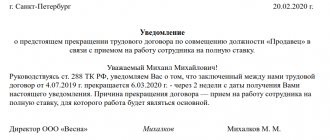Home / Labor Law / Dismissal and layoffs / Dismissal
Back
Published: June 28, 2016
Reading time: 8 min
1
3646
The labor rights of an employee are protected by law more thoroughly than those of an employer, so a subordinate has the right to quit his job at any time and for any reason.
Moreover, even submitting an application and other documents in person is also not mandatory - all this can be done without visiting the place of work, that is, remotely . Read more about the remote dismissal procedure and the nuances of its implementation later in the article.
- Situations when remote dismissal is possible Dismissal factors Territorial
- Temporal
- Personal
Is it possible to resign remotely?
You can resign remotely by following some rules:
- All documents are prepared at least electronically.
- When resigning of his own free will, the employee must submit a statement to the employer.
- Remote dismissal is possible at the request of the employee, agreement of the parties or the initiative of the employer.
- The manager will have to send documents to the dismissed person by mail, obtaining his consent to this.
Important! When terminating a contract remotely, the same rules apply as when terminating offline. It is necessary to take into account the provisions of Chapter. 13 of the Labor Code of the Russian Federation, and if the person resigning works remotely - Ch. 49.1 Labor Code of the Russian Federation.
Take care of your resume
Update your resume on hh.kz in advance, and not on the last day of work. Experts say the average search for a new job takes one to six months; you can cut it down by at least a couple of weeks if you start your search the day you apply.
At your old job, you will have time to rummage through your mail, remember the most interesting projects and find accurate information about your achievements. Pay attention to these three points:
- Portfolio. If you work with texts, websites, design, add a portfolio to your resume. Select works that you are truly proud of so that you don’t have to look for them in a hurry.
- Achievements. When describing the responsibilities you had in the company, mention the best projects and initiatives and back them up with numbers.
- Recommendations. Ask your manager for a written recommendation and permission to include their phone number on your resume. After you quit, it won't be so easy.
Is it possible to dismiss a remote worker without working out?
If a person quits of his own free will, he must submit an application two weeks before termination of the contract (Article 80 of the Labor Code of the Russian Federation). You will have to work 14 days so that the manager can find a replacement. The countdown of this period begins on the day following the date of receipt of the application by the employer.
Work off is not assigned if:
- The employer agrees to dismiss the employee without working on the day he chooses, or by agreement.
- The employee resigns due to retirement, enrollment in a university, or for other reasons when further work is impossible.
Before writing a letter of resignation, it is better to check with your manager whether work is required. The date of dismissal, which will be indicated in the application, depends on this. You don’t have to write it, but then the day of dismissal will be considered the 14th day of work.
Dismissal during a probationary period at one's own request - procedure and features
Dismissal of a pregnant woman
What does the Labor Code of the Russian Federation say?
The law provides for all the necessary components of dismissal of a remote worker, because there can be different situations in a person’s life. But in what cases is such a process allowed? The law does not contain a list of reasons why you can quit offline. It is for this reason that such an issue can be resolved through interaction between the employer and the employee himself. Based on the experience gained, people often quit for the following reasons:
- An urgent move to another place and getting a job there, the reason for which is the illness of relatives and the need to care for them, or the transfer of a military husband to a new place of work;
- The main office of the company is located in another city;
- The decision to quit came to mind during maternity leave;
- Injury or other serious health problems;
- Individual characteristics of the body, which in every possible way interfere with the implementation of this or that work;
- Situations that led to conflict with some employees;
- The reason may also be the character of the person.
In general, an employee has the opportunity to resign in this way if he has any reason that is considered valid. But in this case, no one knows how direct employers will look at it.
Undoubtedly, such dismissal processes can also present certain types of difficulties. This applies to a greater extent to persons who are financially responsible, because upon dismissal they must hand over documentation and valuables. Such situations always involve a process of working out.
Determining the date for remote dismissal
With offline dismissal, everything is simple: a person submits an application, and the period of service begins the next day. If the document is sent remotely, everything is considered differently:
- Via email - from the day following the date of receipt of notice of dismissal by email. This is relevant if a delivery report arrives or the personnel officer himself “unsubscribes” about receipt of the document.
- Via Russian Post - from the day following the day of receipt of notification of delivery of the letter to the employer.
- Through a representative by proxy - from the date following the date of submission of the application.
Example. Before resigning from Magnit, the cashier sent a statement to the main office of the Russian Post on the 10th. The notice of delivery arrived on the 20th, and the countdown of the service period begins on the 21st. There are 30 days in a month. The date of dismissal is considered to be the 4th of the next month.
Payment procedure for remote dismissal
In case of remote dismissal at one’s own request, by agreement of the parties or on the initiative of the employer, the employee is transferred salary and compensation for unused vacation days.
Many organizations have long switched to payments through banks, and money goes to bank cards. If the salary is paid in cash, the person resigning must indicate in the application what details to transfer it to him.
Important! According to Art. 140 of the Labor Code of the Russian Federation, the final payment is made on the last working day.
Procedure for paying compensation to an employee
In addition to issuing a work book to a subordinate, the employer’s responsibility is also to carry out all monetary settlements with him.
These include payment of wages for the period worked and compensation for the remaining days of vacation. The specifics of final settlements depend on which payment method is used at a particular enterprise. If this is a non-cash payment, then the funds are transferred to the subordinate’s open account in the usual manner. If funds are paid in cash, then the employee must indicate the account number for transferring money in his application or in a separate document and give his consent to this.
Documents for remote dismissal
When dismissing an employee, the employer must give him on the last working day:
- work book;
- educational documents;
- certificate of contributions to the Pension Fund;
- SZV-STAZH certificate;
- STD-R certificate, if the work book is kept in electronic form.
Upon written request, a copy of the dismissal order, a certificate for submission to the Employment Center and other documents related to labor activity may be issued.
Note: documents are sent by valuable mail with a list of attachments. It is better to indicate the delivery method in the application, or the employer will have to take written consent from the resigning employee to send it by Russian Post.
Results
The peculiarities of the procedure for dismissal from remote work are determined by the special nature of the interaction between the employee and the employer in the process of such work.
This nature leads both to the emergence of additional grounds for dismissal and to the impossibility of actually applying some of the reasons named in the Labor Code of the Russian Federation. While the process of dismissal from remote work is generally standard for remote workers, due to the availability of electronic exchange, there are special ways to submit and receive documents related to dismissal. You can find more complete information on the topic in ConsultantPlus. Free trial access to the system for 2 days.
Pros and cons of remote dismissal
Let's look at the main advantages and disadvantages
Convenient if there is no opportunity or desire to submit an application in person
Speed with minimum cost and effort
There is a high risk of illegal dismissal if the employer has an enhanced qualified electronic signature of the person leaving. He himself can make a statement instead, and he will have to prove it in court
If the application is sent by Russian Post, it will take a long time for delivery
Work is considered not from the moment the application is sent, but from the day following the day it is received by the manager
There is a possibility that the application will be lost when sent by mail
How to submit a resignation letter remotely
There are several ways to submit your resignation letter remotely:
- By email.
- Russian Post.
- Through a legal representative.
Let's consider each option in detail.
By email
The person leaving needs to know the email address of the manager or the HR department - the application is sent there. It is compiled in MS Word or any other program and signed with an enhanced qualified electronic signature.
If the program provides the opportunity, it is better to include a report on the delivery and reading of the letter by the recipient.
Via Russian Post
The application is sent by a valuable letter with a description of the contents and a receipt. When the document is handed over, the warning period begins to count from the next day. The sender will receive written notification.
Through a representative
The law does not provide for the possibility of filing an application through a representative, but it is not prohibited either. The person leaving needs to issue a notarized power of attorney to the attorney and hand over the application to him. The authorized representative will then submit documents to the employer. If payment of wages is necessary, the power of attorney can be certified by the head of the organization (Article 185.1 of the Civil Code of the Russian Federation).
Important! The powers under a power of attorney can include both simply submitting an application and receiving documents and invoices from the employer. Everything depends on the will of the principal.
How to quit your job remotely: step-by-step instructions
The procedure for remote dismissal depends on the grounds:
- At the request of the employee.
- By agreement.
- At the initiative of the employer.
Let's look at the features in detail.
At your own request
Everything is quite simple here:
- The person resigning draws up a statement, sends it by e-mail or in any other convenient way.
- The employer receives the application and specifies how to deliver the work book and other documents to the employee. Permission to send by mail is drawn up in writing.
- On the last working day, a dismissal order is issued.
- The employer sends the employee a notice of the need to appear at the organization to receive documents, or to give written consent to send them by mail. From this moment on, he is released from liability for late delivery.
- All documents are sent by Russian Post or transferred to a representative if the resigning employee agrees to this.
Sample application
Sample consent
By agreement of the parties
Art. 78 of the Labor Code of the Russian Federation allows you to terminate a contract by mutual agreement. This method is usually used if there are disagreements between the employee and the manager, but there are no grounds for dismissal at the initiative of the employer:
- The employer sends a notice to the employee with an offer to resign by agreement, indicating the conditions: for example, “compensation”.
- The employee receives a notification and gives written consent to formalize the agreement.
- The parties sign the agreement electronically, each with their own signature. One copy remains for both.
The agreement can be drawn up on paper, but then it will have to be sent by Russian Post. This will delay the dismissal period.
Sample agreement
At the initiative of the employer
The most difficult thing is to dismiss an employee at the initiative of the employer, since here you have to follow certain rules:
- The manager discovers an offense from the list of Art. 81 Labor Code of the Russian Federation. Fixes it in documents in the presence of at least two witnesses.
- The employer requests an explanatory note from the offender; it must be submitted within two working days (Article 193 of the Labor Code of the Russian Federation).
- Having studied the explanations, the boss draws up a dismissal order and sends it to the employee for signing. If he refuses to sign it, a corresponding act is drawn up.
- The employer sends a notice to the dismissed person, indicating that he needs to come for documents or agree to be sent by mail.
- The dismissed person receives documents himself or through Russian Post.
If there is no response from the employee, there is no need to send the work book and other documents upon dismissal without authorization by Russian Post. They will have to be issued later upon a written application from the dismissed person no later than three working days (Article 62 of the Labor Code of the Russian Federation).
Important! In addition to the general grounds provided for in Art. 77 of the Labor Code of the Russian Federation, for remote workers there are additional grounds for termination of the contract (Article 312.8 of the Labor Code of the Russian Federation). For example, an employer may dismiss an employee on his own initiative if he does not interact with him on work-related issues for more than two days in a row, unless a longer period is established by the contract. Also, the contract is terminated if the employee moves to another area, which makes it impossible to perform previous duties.
Maintain a good relationship with the company
It happens that dismissal occurs due to conflicts with colleagues or management. Good news from scientists: Office wars are likely nothing personal for employees. An organization is a separate system with its own laws, in which conflicts occupy a special place and perform their functions.
In conflictology, at least four meanings of office wars are defined:
- team unity (for example, employees unite “against” the manager);
- a signal about more acute situations within the team, which are disguised as superficial conflicts;
- an impetus for the creative development of the organization, when it is necessary to look for new solutions for the development of the company;
- changes in the socio-psychological climate within the organization.
Therefore, if a conflict arises with co-workers, just know that you are in some kind of acute situation for the company as a whole, even if it seems as if you were guilty of something or made a mistake. Dismissal is the way out of this situation, and there will be no emotional intensity outside the company. You may have noticed that during the working day you only talk with colleagues about problems, but as soon as you find yourself in an informal setting, negative emotions go away and the topics of conversation change.
Try to ignore the irritation and look at the situation rationally: before leaving, it is important to communicate with colleagues in an informal setting in order to leave a pleasant impression before leaving. This is not difficult to do. Treat your colleagues to a farewell pizza, personally exchange contacts with those employees who are pleasant to you or could be useful, write a final letter thanking you for working side by side and encouraging you not to lose touch. At the interview you will definitely be asked about the reasons for leaving, and after that they may check your references, so the more contacts you can maintain, the better for your career.
Arbitrage practice
While remote workers rarely go to court to challenge dismissal, there are few actual cases in court practice. Here's one of them:
A woman worked remotely as a chief accountant for an individual entrepreneur. First, the entrepreneur fired her under clause 5, part 1 of Art. 81 of the Labor Code of the Russian Federation for systematic failure to fulfill duties. I didn’t ask for an explanation; the dismissal was unexpected for the employee. She went to court, and the order was declared illegal.
Then the defendant-employer fired her under clause 9, part 1, art. 81 of the Labor Code of the Russian Federation for making an unreasonable decision. The woman recovered through the court, seeking compensation for moral damage and unpaid wages. The defendant issued an order to restore her to her previous position, but in fact did not allow her to work. The accountant filed a complaint with the prosecutor's office, but the results of the audit were not communicated to her.
The employer decided to change working conditions by appointing his relative to the position of accountant. In fact, the woman could only agree to worse conditions, or quit of her own free will. She was still not allowed to work; the manager tried to fire her “under the article”, drawing up reports of absenteeism.
The plaintiff filed a lawsuit to declare these acts invalid, reinstate her in her position, recover wages for the period of forced absence, and compensate for moral damage. Decision No. 2-2051/2017 2-97/2018 2-97/2018(2-2051/2017;)~M-1951/2017 M-1951/2017 dated July 17, 2021 in case No. 2-2051/2017 requirements are satisfied.
Lawyer's answers to private questions
Is it legal to submit a resignation letter via email?
Yes. There is no law prohibiting sending in this way. But it is better to check with the employer whether it has been received. It is advisable that the answer is also given by email.
How to fire an employee without his presence if he refuses to pick up documents and sign an order?
The main thing is to draw up an act of refusal and send him a notice requiring consent to be sent by mail. Even if he ignores it, the employer will not be held responsible for the untimely issuance of the work book. It can be issued later, when the fired person applies for it.
Can an employer refuse to dismiss me if I am unable to come and collect the documents in person?
No. He is obliged to dismiss in any case after the end of the warning period. It is better to immediately write about the delivery of documents by mail in the application.
Is it possible to leave remote work without quitting?
No. Leaving remote work is possible through a transfer to offline work in agreement with the employer. In other cases, you will have to quit if you are not satisfied with working online. If you just need a break, you can take a vacation without saving your salary (Article 128 of the Labor Code of the Russian Federation).
How to pick up labor without working off?
Work off is not assigned if the manager agrees to dismissal without it. If you don’t want to go to work, you can take a vacation and then quit. The warning period (14 days) is included in it, as in sick leave. According to the documents, she is appointed, but she will not actually be present at the workplace.
What makes remote work different?
According to current legislation, an employee, in agreement with the employer, can work not in those places that are traditionally considered workers (that is, created and controlled by the employer), but at a distance from them. Remote work can be carried out:
- at home, and then the place of work will be the employee’s place of residence (Chapter 49 of the Labor Code of the Russian Federation);
- without reference to a specific place of work, and then its nature will be determined by the word “remote” (Chapter 49.1 of the Labor Code of the Russian Federation).
What both types of remote work have in common is that they:
- despite a number of features that distinguish them, they are subject to the Labor Code of the Russian Federation and are documented in an employment agreement with the employee;
- allow the fact that the employee performing the work is absent from the place controlled by the employer, which excludes the usual procedure for maintaining a time sheet and deprives the employee of the opportunity to receive additional payments for overtime work;
Read about the specifics of preparing a time sheet for someone working from home in the article “Do I need to keep a time sheet for a home-based employee?”
- allow the employee to independently distribute time of work and rest, and the employer is forced, when issuing a work assignment, to focus on such a volume of work that will allow the employee to fully rest in the intervals between periods of work;
- can be performed by means of labor belonging to both the employee and the employer, and the employee has the right to claim compensation for the use of property belonging to him;
- allow the establishment of a special procedure for the procedure for transferring an assignment to an employee to perform work and receiving its results from him;
- limit the employer’s obligations in terms of ensuring the employee’s labor protection to those that are available to the employer due to the territorial remoteness of the employee or the inviolability of his home;
- allow the provisions of the Labor Code of the Russian Federation to be supplemented with special conditions included in the employment contract.
The difference between working from home and remote work is determined by:
- place of work - for a homeworker it exists and has a specific address, while remote work is not tied to any place;
- the ability to attract other people to work - a person working from home has this (he can entrust part of the work to his family members) and is absent from a remote worker;
- the nature of the results of labor - a home worker creates things that have a material expression, and a remote worker creates intellectual products;
- the presence of direct contact with the employer in the process of work - a homeworker needs such contact (he can receive source materials from the employer and must transfer the final product to him), and interaction with a remote worker occurs through electronic means of communication (with the possibility of issuing an enhanced qualified electronic signature for the employee) and regular mail.
You can learn more about the features of remote work in ConsultantPlus. To do everything right, get trial access to the system and go to the Guide to Personnel Issues.







